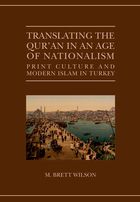Translating the Qur’an

Cover image of M. Brett Wilson, Translating the Qur’an in an Age of Nationalism (Oxford University Press, 2014).
In the latest installment of Review of Qur’anic Research 1, no. 8, Johanna Pink reviews M. Brett Wilson’s new book, Translating the Qurʾan in an Age of Nationalism: Print Culture and Modern Islam in Turkey (Oxford University Press, 2014). At the dawn of the twentieth century, many Muslims considered Qur’an translations to be impermissible and unviable. Nevertheless, printed and translated versions of the Qur’an have gained widespread acceptance by Muslim communities, and now play a central, and in some quarters, a leading role in how the Qur’an is read and understood in the modern world. Focusing on the Ottoman Empire and Turkey, and following the debates to Russia, Egypt, Indonesia, and India, Wilson’s book tries to answer the question of how this revolution in Qur’anic book culture occurred, considering both intellectual history as well the processes by which the Qur’an became a modern book that could be mechanically reproduced and widely owned.
For a long time, Qur’an translations have attracted little scholarly attention. Wilson’s book reflects growing interest among scholars to study such texts and the reasons and circumstances of their production, which can help to shed light on the place of the Qur’an in the lives of those who engage with it in different non-Arabic languages.
Full access to the Review of Qur’anic Research (RQR) is available in the members-only area of our IQSA website. Not an IQSA member? Join today to enjoy RQR and additional member benefits!
© International Qur’anic Studies Association, 2015.
